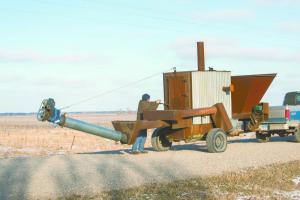2015 - Volume #39, Issue #4, Page #16
[ Sample Stories From This Issue | List of All Stories In This Issue | Print this story
| Read this issue]
Mobile Biochar Maker Processes On-Site
 |
“We were told patenting would be expensive and take years,” says Curtis Borchert, Char Energy, LLC. “It took only 18 months and less than $1,000. Our attorney said it went so fast because nobody contested a single claim.”
Borchert, Brian Borgen, and Noah Storslee developed their prototype unit using parts from an old wood furnace and a combine. The Char Energy gasifier augers biomass through horizontal tubes in a heat chamber that bakes the biomass. As the biomass passes through, biochar and syngass are produced. The syngas is fed back through the machine to help fuel the process.
“We can use the syngas in the gasifier or pull it off for use as an energy source,” says Borchert. “We even use the syngas to fuel the process.”
They were warned that oil and tar from raw wood gas could plug up motors, but they’ve had no such problems with theirs. Borchert suspects it’s because the biochar filters the gas as it is drawn off.
“We've used the syngas to run a 3,500-watt generator for 12 hrs.,” he says. “We just took the carburetor off and put a butterfly valve on it. Once it started, it ran beautifully.”
He also notes that the process eliminates a problem with most gassifers that are unable to produce uniform biochar due to varying temperatures and humidity levels. “We bank ours, set the temperature at 750 degrees, and control it precisely, regardless of moisture content or outdoor temperatures,” says Borchert. “If the temperature dips, the augers stop until the temperature recovers. We get a very uniform product.”
Borchert admits the process is slower than other systems. However, those systems consume up to a third of the biomass as it burns. Their baking process produces an equal volume of biochar for each unit of biomass that enters.
“The biochar that comes out is 75 percent carbon, with most of the remainder silicate,” says Borchert. “It can be used like coal.”
He estimates their mobile 9-tube gasifer could process up to 900 lbs. of biochar per hour. It would be priced at about $40,000. The process is size-neutral and could be upsized significantly in a permanent facility.
“We designed the mobile unit so it could be set up in a field where the biochar would be spread,” says Borchert. “It could be moved from field to field as well as farm to farm.”
Borchert admits that the prototype is rough and without any insulation. As it is, burning a single wood pallet every half hour will keep the process at 750 degrees.
“If we insulated it, the syngas alone would likely be enough to keep it at temperature,” says Borchert.
Contact: FARM SHOW Followup, Char Energy, LLC, 2852 170th Ave., Ada, Minn. 56510 (ph 218-784-3104).

Click here to download page story appeared in.

Click here to read entire issue
To read the rest of this story, download this issue below or click here to register with your account number.




